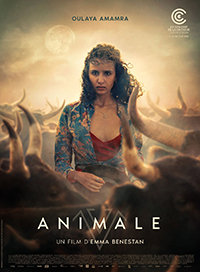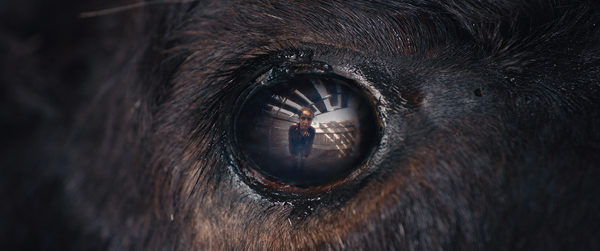Toro Toro Toro: Amamra Grabs the Bull By the Horns in Transformative Role
 For those who champion the bull in Spain’s electrifying yet antiquated tradition of the running of the bulls, there’s a fresh perspective awaiting in a genre-blending narrative that redefines and realigns the boundaries between genders and species. Departing from her beginnings in young adult romantic comedy with Fragile (2021), French-Algerian filmmaker Emma Benestan reunites with Oulaya Amamra for their third collaboration—a sophomore film that exudes a Cocteau-esque spirit with hints of whac-a-mole horror genre elements. An exploration of crossed boundaries and crossing over, Animale is reminiscent of last year’s Le Règne animal and especially Julia Ducournau’s Raw, despite embracing what is a familiar, well-trodden path, we find a fresh take on violence as redemption and salvation.
For those who champion the bull in Spain’s electrifying yet antiquated tradition of the running of the bulls, there’s a fresh perspective awaiting in a genre-blending narrative that redefines and realigns the boundaries between genders and species. Departing from her beginnings in young adult romantic comedy with Fragile (2021), French-Algerian filmmaker Emma Benestan reunites with Oulaya Amamra for their third collaboration—a sophomore film that exudes a Cocteau-esque spirit with hints of whac-a-mole horror genre elements. An exploration of crossed boundaries and crossing over, Animale is reminiscent of last year’s Le Règne animal and especially Julia Ducournau’s Raw, despite embracing what is a familiar, well-trodden path, we find a fresh take on violence as redemption and salvation.
Amidst the sun-drenched rustic beauty of the Camargue region in the South of France that contains a timelessness hence the traditional, almost Gaucho Gaucho approach to life and a thriving unique dialect, here, bold yet perhaps idealistic youths engage in the local custom of bull running—an activity that, while distinct from the artistry of the matador, serves as a gritty precursor to more severe acts of violence. Violence, indeed, permeates the very fabric of this environment. Enter Nejma Chokri (Amamra), a young woman navigating the physically demanding, male-dominated landscape of this boy’s club. Determined to prove herself amidst skeptics and to seamlessly integrate into this tight-knit, perhaps chauvinistic group, Nejma must confront a fundamental question: who truly embodies the essence of the beast? The arena here is much larger than we would think.

Primarily filmed in outdoor settings, the cinematography by Titane’s Ruben Impens in this film evokes the visual style seen in earlier works by Julio Medem, where a profound connection to nature and an intimate exploration of the souls of sentient beings were central themes. Additionally, the nocturnal atmosphere reminiscent of Agustina San Martín’s To Kill the Beasts adds to the cinematic echoes present in this film.
Working from the premise that equality is a fundamental right rather than a privilege to be earned, Benestan skillfully weaves together themes of community, tradition, betrayal, rebellion, masculinity, and the symbolic use of the bull as a central motif. This allows for a seamless transition from reality to myth, with the unchecked force of nature mirroring the aftermath of a vengeful world akin to that of Jason Voorhees.

While some on-screen relationships may feel contrived and certain interactions appear stiff, Amamra’s portrayal shines through – her character, wide-eyed and resolute, embodies the essence of determination and the longing to belong. A pivotal sequence where Nejma requires stitches exemplifies her unwavering resolve and her quest to fulfill her deepest desires. Still, the major take-away here is that gore, deep wounds are no less worse than being “relegated” back to your gender — a pivotal sequence of the beast being branded weighs heavily throughout and when Animale truly comes into its own when it moves away from being guided by the bulls to accepting no more bull.
Reviewed on May 22nd at the 2024 Cannes Film Festival – Critics’ Week – Special Screening. 98 Mins.
★★★/☆☆☆☆☆


